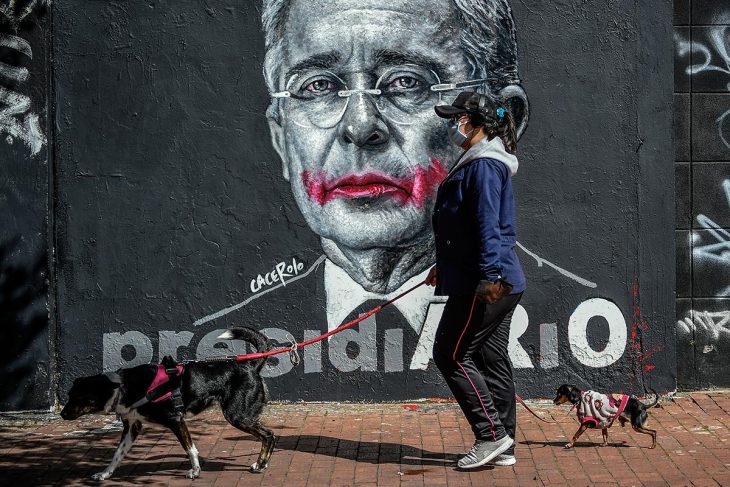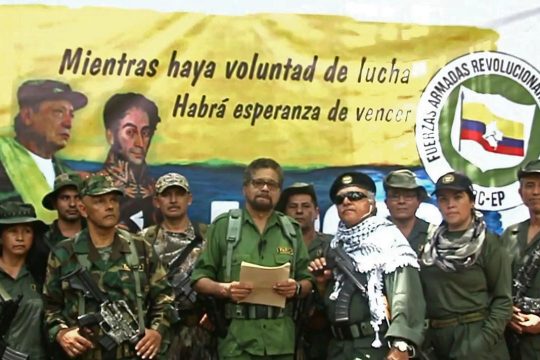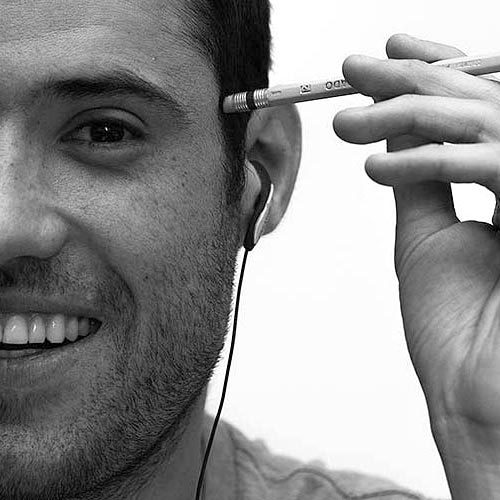August has been a turbulent month for Colombian politics, after former president Álvaro Uribe was placed under house arrest in the midst of an investigation over alleged witness tampering. Uribe, the country’s most powerful politician and a long-time opponent of the 2016 peace deal signed by the Colombian government and the former Revolutionary Armed Forces of Colombia (FARC), contends that the probe against him amounts to political persecution. He and his party are now using the fledgling transitional justice as a punching bag, in a bid to contrast his legal difficulties with the fact that former FARC rebels are yet to be convicted of crimes they committed during the armed conflict.
In mid-August, in an ironic turn of events, Uribe went from accuser to defendant after a suit he filed against a rival senator who contends that he and his brother helped create a paramilitary group in his home region of Antioquia in the mid 1990s backfired. After his lawyer was charged with purportedly attempting to bribe witnesses who could testify against the former president, the Supreme Court unanimously decided that Uribe could potentially obstruct justice and should be placed under house arrest for the duration of the investigation.
Uribe’s strategy
Uribe, who claims he is innocent and stepped down from his Senate seat last week, has sought to portray the probe as the result of a justice system mired by corruption and political retaliation. His resignation complicated a fuzzy case even more, as the Supreme Court could lose its jurisdiction.
The former president’s strategy has been twofold. On one hand, he has repeatedly called his opponent, senator Iván Cepeda, part of “a new generation of the FARC”, without offering any evidence to back his accusation. Cepeda, a staunch defender of the peace accord and a left-wing politician whose father was murdered by the paramilitaries in cahoots with state agents, was never a part of the guerrilla and has been a lawmaker for over a decade under a different party than the one created by the former rebels.
This association, however, allows media-savvy Uribe to revive an old ghost, in a country where the now demobilised guerrilla remains vastly unpopular. He owes a significant part of his political capital to his role in weakening them militarily a decade ago, paving the way for his successor Juan Manuel Santos to lead them to the negotiation table. To this day, less than 10 percent of Colombians have a positive perception of FARC, even though two thirds of them still believe that a negotiation was the best way to end a 52-year-old armed conflict that has left more than 9 million victims.
The best defence is a good offense
Uribe and his followers are also seeking to contrast his detention with a widely derided legal fiasco involving a former high-ranking FARC member who spurned the peace deal and is now a fugitive.
Jesús Santrich, a former FARC negotiator and one of their 10 leaders who had been guaranteed a seat in Congress under the peace accord, was sought in extradition after being caught in a US-led sting operation apparently planning a drug operation after the peace deal was signed. After several months of political bickering between Iván Duque’s government, the transitional justice system, the US Embassy and the Attorney General, they were unable to reach an agreement on how to disclose evidence gathered by the US.
This was a crucial piece of information needed to determine whether the transitional justice or the ordinary one should try him, and if an extradition was possible. The Supreme Court ruled that as an elected lawmaker, Santrich’s case fell under its jurisdiction and determined he could remain in liberty during the proceedings given his commitment to the peace agreement. The former rebel, however, ended up fleeing and joining a minority group of former FARC leaders who went up in arms again in mid-2019. Uribe and his party sought to make him a poster child of the accord and in particular the transitional justice’s flaws.
Targeting the courts
Even if the Santrich fracas eroded the credibility of all the institutions involved, Uribe and his party have pinned the blame squarely on the Supreme Court, the same one now probing Uribe, and the Special Jurisdiction for Peace, locally known as JEP. “Shameful: in a 23-page decision, the Supreme Court left narco-terrorist Santrich - now a fugitive and sought in extradition by the US - in liberty. In a 1,554-page one, it now tries to justify depriving former president Uribe of his liberty,” said senator Paola Holguín.
Even President Duque, who was groomed for the job by Uribe and belongs to his party, lobbed a thinly veiled jab at the transitional justice. “It hurts as a Colombian that many persons who brutally wounded the country are allowed to defend themselves in freedom or are even guaranteed they will never go to prison, while an exemplary public servant who occupied the country’s highest dignity isn’t allowed to defend himself at liberty, his presumption of innocence respected,” he said in a public address.
Even though there is no factual basis for this parallel, given that Uribe is not being prosecuted for crimes committed during the armed conflict, the symbolism is not lost on many Colombians who credit him for saving the country from FARC’s clutches and cannot understand why after two and a half years the peace tribunal hasn’t yet brought charges against any of the former rebels.
More attempts to modify the transitional justice?
Amid Uribe’s detention, his party is renewing calls to modify the Special Jurisdiction for Peace, the judicial arm of the transitional justice system they have unsuccessfully tried to modify twice in two years. Paloma Valencia, a senator close to Uribe who has announced her interest in running for the presidency in 2022, called for a constituent assembly to reform the entire justice system, including merging the country’s top courts into a single one and eliminating the JEP. “Colombia should stop accepting the JEP, a jurisdiction created to benefit terrorism and guarantee impunity for those who blew up entire towns, cruelly kidnapped millions of Colombians and forcefully recruited children. The JEP must end,” she said in Congress. She had already announced in May that she would introduce a fifth bill seeking to reform the transitional justice system.
The governing party already backed her initiative to seek a complete makeover of the country’s 29-year-old Constitution, although Duque shied away from it. They currently don’t have a majority that would allow them to reform the entire Constitution, but such a scenario risks opening the doors to dismantling the peace deal that paved the way for 13,302 rebels to lay down their weapons in 2017 and that is legally enshrined in it.
Can the former president face the special peace tribunal?
Uribe’s legal difficulties have revived an old debate in Colombia: can the former president face the special peace tribunal? Although witness tampering charges fall under ordinary criminal law, the Supreme Court is also investigating Uribe in 30 other cases and Congress in 200 cases, many of which could be indeed linked to Colombia’s armed conflict. Even the probe that led to his detention could be connected, because right-wing paramilitary groups, originally born to counter left-wing guerrillas in the 1980s and eventually responsible for thousands of homicides and massacres, are considered a party to the conflict.
No other accusation against Uribe has advanced in the justice system, but if it did the former president could face the possibility of a lengthy prison term. The JEP would instead allow a 5-to-8-year sentence in a non-prison setting, provided he acknowledges responsibility, contributes the truth and redresses victims.
Save for one detail: the JEP is barred from prosecuting former presidents. Ironically, it was Uribe’s party who pressured for them to be excluded from the transitional justice’s jurisdiction, as they always characterised the JEP as an attempt to prosecute their leader.
Legal security vs political legacy
This happened after negotiations on the transitional justice chapter of the peace deal stalled in mid-2015 and Santos tapped three external jurists to step in and help accelerate discussions. In September 2015, after they announced they had reached a preliminary agreement with FARC on what the JEP would look like, journalists asked them if former president could eventually be prosecuted. It could, they responded, even though nothing in the text either confirmed nor denied that hypothetical case.
As a result of the ensuing controversy, the Government’s negotiating team pushed to introduce a clause in the agreement barring the prosecution of former presidents by the JEP. In the end, the accord reiterates that the ordinary legal rules apply to them. This could change as a result of a broad political consensus, although Uribe and his party’s distrust of the JEP is still a major obstacle.
In the long term, that Uribe may benefit from the transitional justice’s special sanctions regime may hinge on his decision to prioritise his legal security over his political legacy.

THE SAGA OVER MANCUSO’S EXTRADITION
Another legal drama has unfolded over the past week, as Duque’s government has fumbled its attempts to bring back former paramilitary boss Salvatore Mancuso to Colombia.
Mancuso, who spent 12 years behind bars in the US after being convicted on drug trafficking charges, is accused of having been involved in thousands of human rights violations in Colombia as a leader of the defunct United Self-Defence Forces of Colombia (AUC). He requested being deported to Italy, where he also holds citizenship, a move that sparked outrage among victims of the paramilitary groups who want him to own up to his crimes. Mancuso himself has said on a number of occasions that he is willing to speak out.
News emerged that Duque’s government has presented three extradition requests since this year, all of them with mistakes rendering them useless. A fourth one was sent last Thursday, although it is unclear it can be processed before the August 26 deadline for him to be sent to Italy.
President Duque vowed that Mancuso’s crimes will not be left unpunished, but his administration’s strategy to avoid this scenario has fallen flat. Peace commissioner Miguel Ceballos said they would ask the European Court of Human Rights to prosecute him, apparently unaware that the tribunal hears cases against states and not persons. Duque said they could also appeal to the universal jurisdiction or even ask the International Criminal Court (ICC) to step in. It would be up to Italy to decide to bring charges against Mancuso under universal jurisdiction principles. As to the ICC, it could end up having unintended consequences. Evidence wouldn’t be missing between 2002 and the time of Mancuso’s demobilization in December 2004. But the court could interpret the referral not as a single case, but in relation to the country’s situation. Given that the ICC Office of the Prosecutor has an ongoing preliminary examination on Colombia, this could hurt the country’s long-held argument that it is willing and capable of prosecuting these crimes – potentially leading to the indictment of Army generals, former FARC leaders and even Uribe.
Should Mancuso arrive in Colombia, it isn’t clear which court would assume his case. The JEP turned down one of his admission requests in June, on the grounds that he claimed having aided and abetted the paramilitaries, when he was in fact an active member of them. The tribunal did open the door for him to present himself as a witness testifying how other third parties or state agents colluded with such groups.
So far, the legal saga is showing that Duque’s discourse of opposing lenient sanctions for mass atrocities committed during conflict is thwarted by his government’s lack of diligence in bringing the mastermind of some of the most egregious crimes Colombia has seen to face his victims.








